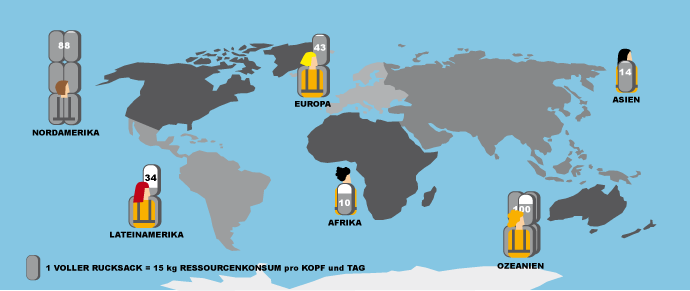
Global Responsibility
Growth of world population, continued high levels of consumption in the developed world as well as the rapid industrialisation of countries such as China, India and Brazil are increasing the worldwide demand on natural resources and related pressures on the environment. While extraction of many non-renewable resources, such as oil and several metals, is already reaching or near a peak, renewable resources, and the ecological services they provide, are at great risk of degradation and collapse.
Developing countries need to augment their material wealth and escape poverty in the future. At the same time total global resource consumption must be stabilised in the short-term and reduced in the medium term. “Globalisation” – just like the principle of sustainability – has to be understood as a multi-layered and complex process which is not only economic in nature. Therefore it is essential that all world regions recognise their specific global responsibilities to realise sustainable development.
In the thematic area ‘global responsibility’ SERI works on the quantification and illustration of global interrelations between the use of natural resources by different actors, transport originating from the interconnectedness of the international trading system, and resulting environmental pressures. One focus is set on tracing the impacts of the European life style on the living conditions and developing prospects of people in other parts of the world.

![[date]](/wp-includes/images/smilies/date.png) News
News " class="wp-smiley" /> Blog
" class="wp-smiley" /> Blog![[paper]](/wp-includes/images/smilies/report.png) Publications
Publications![[person]](/wp-includes/images/smilies/user.png) People
People![[projects]](/wp-includes/images/smilies/bricks.png) Projects
Projects![[people]](/wp-includes/images/smilies/group.png) Partners
Partners